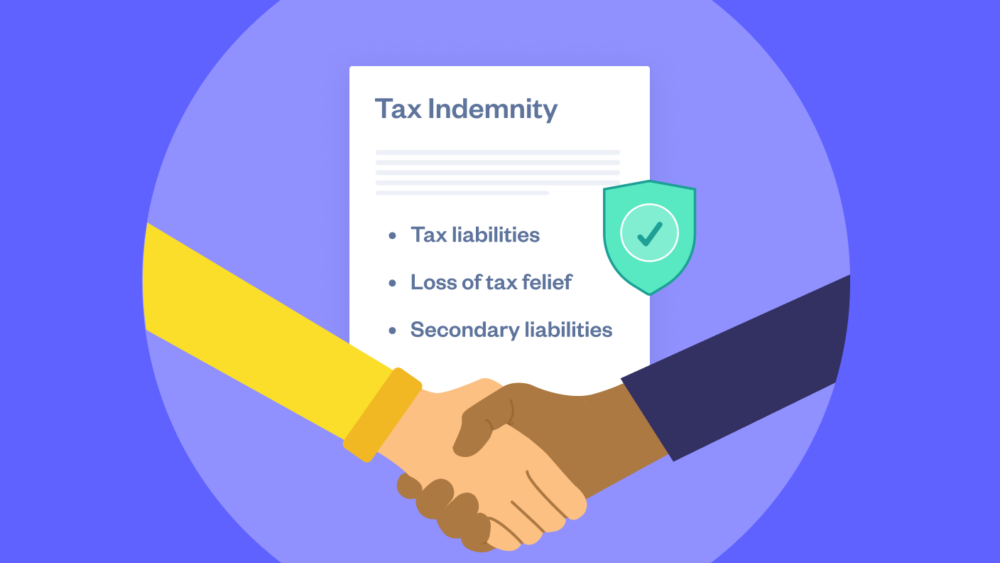Exit strategy: what it is and why you need one
An exit strategy helps you plan your startup’s future, attract investors, grow strategically and maximise returns for fo...
Selling your company? Your buyer might want to add a tax indemnity to the share purchase agreement, to protect themselves from any pre-completion tax liabilities that might come to light after you complete the sale.
If you haven’t sold a company before, the legal intricacies of the deal might feel like confusing, uncharted territory. At SeedLegals, we’re here to help. Since 2016, we’ve helped thousands of SMEs with the legals for hiring staff, taking investment and selling their company.
In this post, our expert Anna Sivula explains tax indemnities in simple terms: how they work and how they differ from tax warranties.
A tax indemnity – also known as a tax covenant – is a legal promise you make (as the seller of your business) to pay the buyer if your company has any tax liabilities before the deal completes, that weren’t revealed during due diligence.
The tax indemnity is a common feature in a share purchase agreement (‘SPA’), and it’s designed to protect the buyer from potential tax issues that could crop up after the sale completes.
Usually, a buyer wants to include a list of warranties in the SPA. These warranties are promises you make as the seller about the business and affairs of your company. If any of the warranties prove to be untrue, the buyer can sue you for damages.
But if some of these warranties relate specifically to tax, why does the buyer usually ask for a tax indemnity as well? It’s because generally an indemnity gives the buyer better protection than the warranties alone.
For example, a successful indemnity claim will usually give the buyer better financial compensation (also known as damages) than a warranty claim. Under the tax indemnity, the buyer can recover the amount of the tax liability on a pound-for-pound basis even if the company’s valuation doesn’t decrease as a result. Whereas for a breach of warranty, the buyer would have to show that the valuation decreased. The buyer also generally doesn’t have to prove that they have taken steps to mitigate or reduce their losses, whereas for a breach of warranty, they do have to mitigate the loss.
The share purchase agreement usually gives the buyer the right to choose whether they want to claim under a warranty or the tax indemnity, but normally they aren’t allowed to claim under both for the same loss.
Founders selling their company often ask us why a buyer should have the benefit of a tax indemnity as well as the tax warranties, especially since the same level of protection doesn’t apply to non-tax liabilities.
Part of the reason for adding tax warranties to the SPA is simply to flush out potential tax problems before the sale completes. You can consider the warranties to be a checklist of issues you (as the seller) must disclose to the buyer before completing the sale. If you disclose any issues (or the buyer discovered any), both parties can agree to adjust the price while you’re negotiating. This is considerably easier than making a claim after the sale completes, which can be costly and there’s no guarantee the claim will be successful.
Of course, if any issues arise that you didn’t reveal during due diligence, the buyer will be able to sue you for damages to recover the losses. For a warranty claim, there are some limitations on what losses can be recovered and, as mentioned above, a tax indemnity gives the buyer better protection than the warranties alone.
Anna SivulaThe tax indemnity gives the buyer of your company the right to recover, pound-for-pound, their losses resulting from tax liabilities even if the company’s valuation stays the same.
Basically, the tax indemnity is a way to adjust the price of the deal after it’s completed. The indemnity helps allocate risk between you and the buyer so that you remain responsible for tax incurred in the time before you complete the sale of the company.
Senior Legal Associate,
The tax indemnity usually covers tax liabilities of your company, in the time before you complete the sale. A typical tax indemnity covers a few different types of liabilities:
The tax indemnity is not totally one-sided – there are usually exclusions to set out liabilities that it would be unreasonable for the seller to be responsible for. Some typical exclusions include:
Claims under tax warranties and the tax indemnity usually have a longer time limit than non-tax warranty claims because tax claims can take longer to surface, partly because HMRC has the power to reopen a company’s tax affairs for years after the original accounting period.
For example, the statutory period for HMRC to make a Corporation Tax, Income Tax or Capital Gains Tax assessment is four years after the relevant accounting period or period of assessment. This increases to six years if the loss of tax is caused by careless inaccuracy.
In practice, a limitation period of between four and seven years is common. This gives the buyer sufficient time to discover and make a claim for any tax-related issues that might crop up after you complete the sale.
Selling your company with SeedLegals? If you have any questions about the tax indemnity or the Key Terms, ask your dedicated Exit expert or tap the live chat button (bottom right of this screen) to ask us. We’re always happy to help.
Selling your business is a major decision. If you’re ready to sell or just considering it, find out more and talk it over confidentially with our experts.
Tell me more






